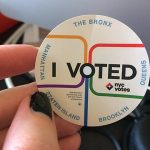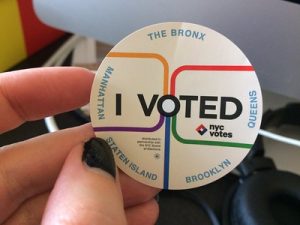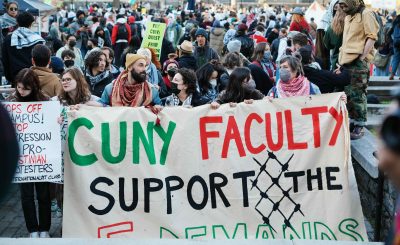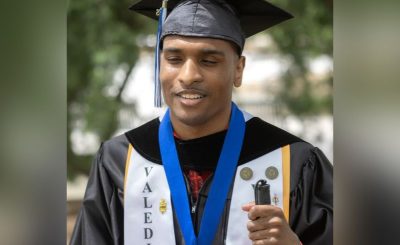
By Ethan Santos
The mayoral race in New York City is now underway, but with seven main candidates running for office, electing a new mayor can feel daunting. Fortunately, there are several resources and steps that QCC students can take to make a better-informed decision.
What matters most to students: Equity, Housing and Education
When asked about specific issues for the next mayor to address, some of the key concerns that students brought up included inequality, homelessness, and financial aid.
Kenya, who is a student majoring in psychology, spoke about the effects that redlining has had on her community. “I think the division between races in my community has been exacerbated over the last… couple of years, and I think that’s probably my biggest issue in my personal community,” she said.
For Denali, a film and media production student, the current administration could use improvements, especially when it comes to protecting LGBTQ rights. A survey from Pew Research Center on how LGBTQ adults feel about Trump’s policies found that “71% expect a negative impact on those who are gay, lesbian or bisexual.” Given Mayor Adams recent cooperation with the Trump administration, students like Denali may experience uncertainty when it comes to how LGBTQ rights and safety will be affected.
Concerns regarding access to healthcare, education, food, and shelter being taken away, which are essential to many New Yorkers, have also been circulating. It is no surprise that the cost of living in NYC has significantly increased, given that half of city households struggle with affordable housing, food, and healthcare. , as the non-profit Fund for the City of New York reported in 2023.
Consequently, there is now a larger presence of homeless people in the city. According to Coalition for the Homeless, “more than 350,000 people were without homes in NYC in January 2025.” Several students noticed this trend and feel that it is an issue that the next mayor should tackle. “There’s a bunch of buildings that are completely empty because no one can afford their rent,” Kenya noted.
With recent cuts to CUNY colleges, financial aid and college affordability has become another growing concern among students. Jadn, a sociology major and president of Queensborough’s Young Democratic Socialists of America said, “some of my friends just didn’t have access to school.” College is still out of reach for a lot of people and that there needs to be more affordability and access to these educational opportunities, Jadn says.
Cole, a psychology student who works with NYPIRG on campus, expresses similar frustrations, especially after noticing that his TAP had been reduced and having heard that the Excelsior program may be in danger of being cut.
“We need these programs because no one makes a living wage, let alone a wage to afford an education,” he said.
On top of inequality, homelessness, and financial aid, students would like to see improvement in were public transportation, environmentalism, cost of groceries, and immigrants protections. Both Jadn and Kenya spoke in particular about how changes in Q27 and Q30 scheduled times to arrive and depart could impact their ability to get to campus.
Impacts to CUNY and thoughts about certain candidates
Whether New Yorkers elect a new mayor or re-elect current Mayor Eric Adams, faculty members as well as some students believe that the next person to take office can greatly impact CUNY.
Dr. Clarence Jefferson Hall Jr., an associate professor of History, says CUNY can absolutely be impacted because “most of the funding for community college in CUNY comes from the city budget, while the four-year schools receive most of the funding from the state.” Therefore, the candidate that gets elected greatly matters. CUNY’s budget has been cut several times during the Adams administration, he explains. According to the New York City Comptroller, “In FY 2023, successive reductions to CUNY’s funding from the City of New York totaled $155 million, resulting in the loss of 235 faculty and staff positions.”
Among students who were interviewed, there was a mixed reaction. Most were unsure if a new mayor would have much impact; however, some felt that CUNY can significantly be impacted, for better or worse, depending on the candidate.
“I think that if we elect Cuomo or Adams, like idiots, the impact will be either there will be no impact or there will be a big negative impact,” said Cole.
Jadn expressed similar opinions. He believes that CUNY could certainly see improvements, but only “if the right one gets picked.” Like Cole, Jadn feels that the Adams administration has not performed well due to them defunding education and transportation and removing free school lunches. He feels that Adams is corrupt and is not suited for the role as mayor.
This prompts the question, “what makes for a good mayor?” Most students agreed that a mayor should be truthful, attentive, fair, and empathetic, and a good leader.
One candidate in particular that has become popular among a few students is Zohran Mamdani. Both Cole and Jadn were drawn to his policies and considers him as the best choice for mayor. Jadn believes that Mamdani would democratize food and help to fund CUNY colleges. “He protests for things that would be good for everyone,” said Cole.
Many students have not yet decided on the candidate they wish to support. For this reason, it is important to first look at the candidates priorities, values, accomplishments, involvements, and possible setbacks.
Here are the candidates
Eric Adams
Back in 2021, Mr. Adams ran as a former police captain with a goal to lower crime and end racial injustice in policing. However, over the past four years, he has encountered multiple setbacks. He was indicted on account of federal corruption charges while his administration faced multiple investigations with many key figures resigning. Currently, his approval ratings have hit an all-time low.
Mr. Adams has also received criticism in late January for attending President Trump’s inauguration rather than celebrating Martin Luther King Jr. day back in New York City. Some speculate that this was a strategic move for Adams to be granted a pardon. Many Democrats have since expressed concerns over his relationship to the president, fearing that the people and the party’s values are no longer being prioritized.
Despite these challenges, Mr. Adams still receives support from certain communities and is ranked fourth in the mayoral race as an independent. His main priorities are to improve public safety, the economy, and the quality of life in NYC.
Andrew Cuomo
Mr. Cuomo was the former governor of New York for 11 years. His last term abruptly ended in 2021 after being caught in a sexual harassment scandal involving 13 women.
He is currently leading in the polls, receiving an overwhelming 41% support. Throughout his campaign, he has highlighted past achievements involving overseeing large infrastructure projects, lowering taxes, legalizing same-sex marriage, and leading the state during the Covid-19 pandemic.
In this election, Cuomo has faced tremendous backlash by the other candidates regarding the allegations against him. Additionally, the 9,250 nursing home deaths during Covid has also resurfaced, sparking immense criticism. Yet, despite these controversies, Cuomo is determined to become mayor and is focused on affordability, public safety, mental health, education, and combating antisemitism.
Zohran Mamdani
Mr. Mamdani is a state assemblyman and democratic socialist who immigrated from Kampala, Uganda to New York City at the age of 7. He has fought for the working class people, winning $100 million to help increase subway service and fare-free bus pilot, and is currently working to reduce the cost of rent. Mamdani is also a strong critic of Eric Adams and Andrew Cuomo, advocating that NYC needs a mayor who is not corrupted.
He has gained significant popularity within a few months, raising over $3.4 million in public matching funds and becoming the second most popular candidate in this election. His primary focus is to lower New York City’s cost of living by freezing rent, eliminating the fare on all city buses, creating city-owned grocery stores, and increasing the minimum wage to $30/hour by 2030.
Mamdani is a growing favorite among youth voters in Brooklyn and Queens, and his campaign has received some of the most generous donations from supporters, averaging $74 per contribution.
Adrienne Adams
Ms. Adams is the current City Council speaker as well as the first African American woman to fill that role. Although she did not originally consider running, some Democrat leaders urged her to join the mayoral race. Admist all the chaos that has recently taken place, she believes that New York City deserves a leader that will put people first.
She is an advocator for women’s health and has expanded access to abortion and reproductive healthcare. Adams funded community safety through a $5.1 million budget initiative she created as speaker. She has also addressed the housing crisis, leading the council to approve nearly 40 lands projects in 2022, equating to 12,000 units with 63% being affordable.
As speaker, she has been a champion in advocating for diversity, leading the first women-majority Council in NYC. However, her main struggles going into this election is less recognition and fundraising compared to some of the other candidates.
Brad Lander
Mr. Lander is the current comptroller for NYC. His long-time commitment to the city, diligence, and experience makes him feel qualified to lead as mayor.
Throughout his term, he has frequently criticized the Adams administration, holding them accountable for their failures and poor management. Brad has improved New York City’s pension funds, ensured adequate health care to retirees, invested in publics schools, and expanded workers’ rights.
In this election, one of Landers topic priorities is to end street homelessness for people with serious mental illness by placing them in vacant homes. He is one of the leading candidates in fundraising.
Scott Stringer
Mr. Stringer is a former city comptroller and state assemblyman that has been elected several times. He lived in New York all his life and believes that his competence and experience will help improve the city.
In the past, stringer has advocated for affordable housing, child and education, and public safety. He has also increased NYC’s pension funds from $147 billion to $240 billion, which is a cumulative return of 9.12%.
However, when stringer previously ran for mayor back in 2021, he had faced allegations of sexual assault, which he denies. He is now reentering the political scene with goals to improve public safety and quality of life, tackle corruption, and create affordable housing.
Mamdani is a growing favorite among youth voters in Brooklyn and Queens, and his campaign has received some of the most generous donations from supporters, averaging $74 per contribution.
Jessica Ramos
Ms. Ramos is a state senator from Queens. Over the past six years, she has helped to raise the minimum wage, expand child care, and secure tenant protections. She also maintained close connections with unions.
Ramos is the daughter of two Columbian immigrants, and has devoted her life to helping the working class people. She helped to secure $2.1 billion that was used to create a fund for workers that were excluded from pandemic relief. In 2024, Ramos also opposed Met’s owner Steve Cohen from building a largo casino complex in her district.
Her campaign’s main concern right now is fund raising.
What resources and steps can students take?
After viewing a brief glimpse into each candidate, choosing the next mayor may still feel like a difficult decision, which is why students should take advantage of the resources available and follow certain steps in order to find the candidate that best aligns with their values and concerns.
Dr. Adam Luedtke, an associate professor of Social Sciences at Queensborough, believes that NYPIRG can serve as an excellent resource for students that are interested in learning more about the mayoral election.
“NYPIRG has an office in the Student Union building and they are very involved in voter awareness, registration, policy issues in the election, etc.” said Professor Luedtke.
Another way to learn about the mayoral candidates is simply through visiting their individual social media accounts. Professor Hall Jr. explained that most of the candidates “have social media specialists who put together short videos and informational graphics that are then posted to their accounts that are easily digestible for people who don’t have lots of extra time to study the candidates and their issues.”
For anyone interested to learn more about voting, CUNY Votes is an excellent site to visit. They help students learn about the elected officials that represent them, provide a list of registration coordinators for each CUNY college, and offer a how-to guide when it comes to registering to vote.
These resources provide adequate information on the election while explaining the process it takes for students to vote. CUNY has helped to simplify this process. In fact, one CUNY guide states that the “NYS voter registration form is available through your CUNYfirst account. It’s a personalized form that you can mail in yourself. You don’t even need a stamp. It’s as simple as that.”
Why students’ voices matter in this election
The mayoral election can appear complex and difficult to navigate; however, this should not discourage students from voting. There are lots of students at QCC who feel that their vote won’t make a significant impact in shaping policies or electing certain candidates, but this is simply not true.
“Turnout in local elections (especially primaries) is incredibly low, so there’s a much better chance your vote will actually matter. The last Democratic Primary for City Council in my neighborhood was won by only 123 votes, so a few more people participating could have swung the outcome a different way,” said Professor Luedtke.
In this election, it is important for students to be true to themselves, but voting is just one of many steps for students to spark change. Emailing elected officials, volunteering, and joining a club that is meaningful are other ways students can advocate for their beliefs and values. Professor Hall Jr. states that “Real and meaningful change always starts with the people who do the hard, often tedious, work that you don’t read about in the news. But if enough people get involved and do the work, change is possible.”




